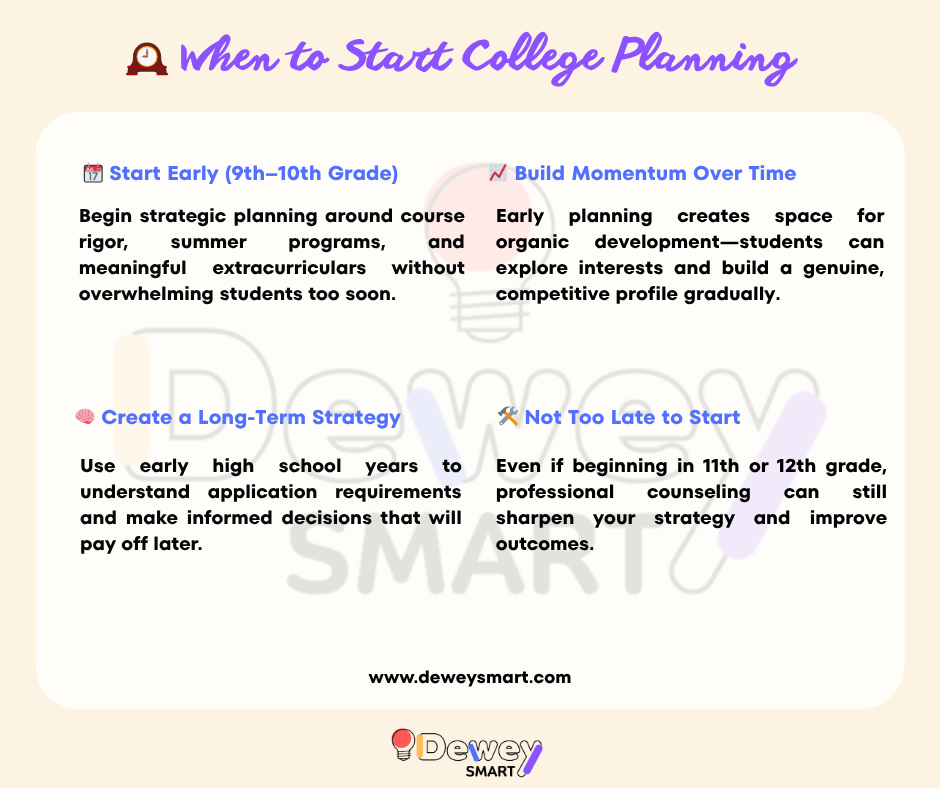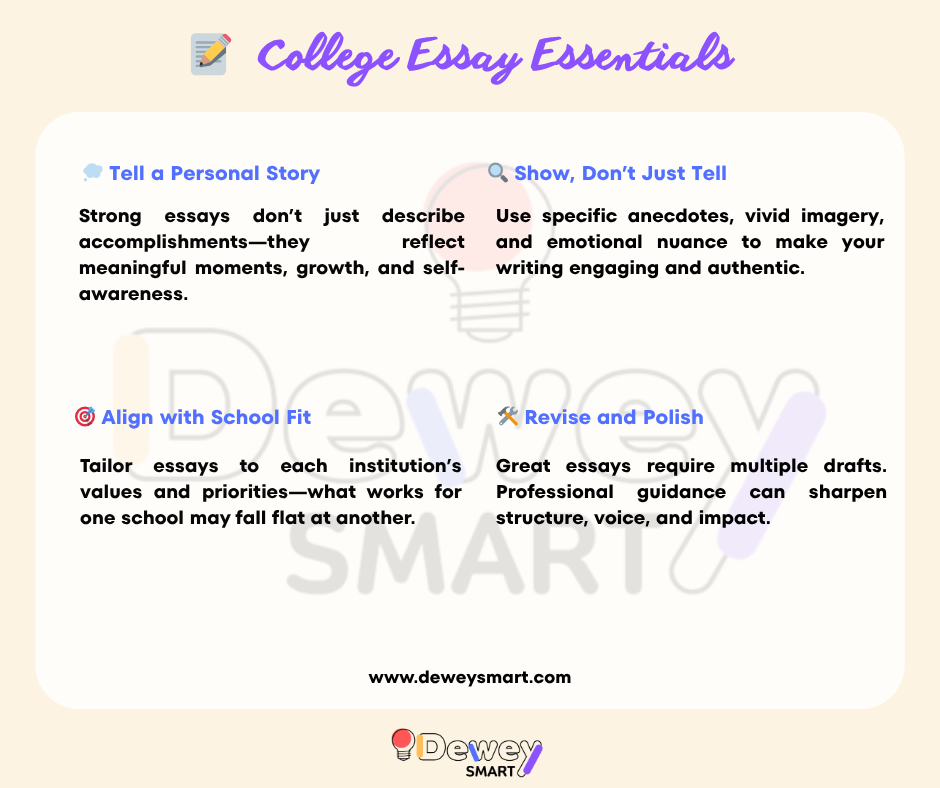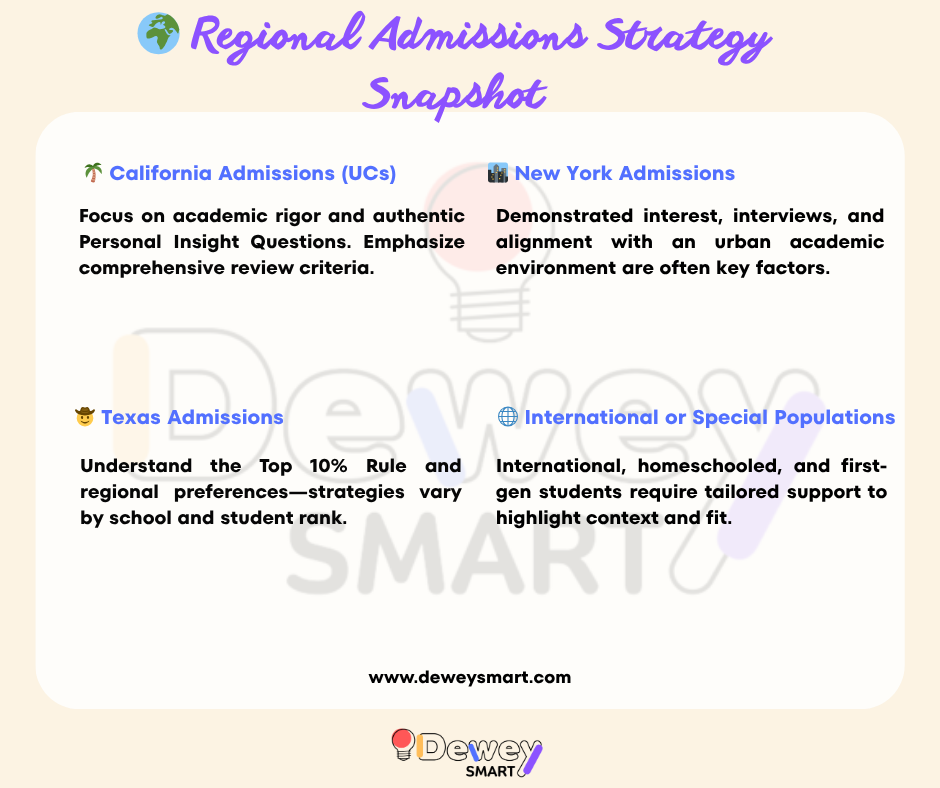
Navigating the college admissions process can feel overwhelming for both students and parents. With so many moving parts—from standardized tests to essays, financial aid to extracurricular activities—it's natural to have questions. Understanding what to ask and when to ask it can make the difference between a stressful experience and a strategic, successful journey to college acceptance.
One of the most common questions parents ask is when to begin college admissions counseling. The answer might surprise you: ideally, as early as 9th or 10th grade. This timeline allows students to make strategic decisions about coursework, extracurricular activities, and summer programs that will strengthen their applications.
Starting early doesn't mean overwhelming your freshman with college pressure. Instead, it means making informed decisions about class selection, identifying genuine interests, and building a foundation for future success. Even if you're starting later, remember that it's never too late to begin strategic planning.

College counseling services provide personalized support throughout the admissions process. A skilled counselor helps students identify colleges that align with their academic interests, career goals, and personal preferences. They guide families through the complex landscape of applications, deadlines, and requirements while helping students develop compelling narratives that showcase their unique strengths.
Professional counselors also assist with creating balanced college lists that include safety, match, and reach schools. This strategic approach ensures students have viable options while still pursuing their dream schools.
The college application landscape includes multiple platforms and requirements. The Common Application serves over 900 colleges, allowing students to apply to multiple schools with one application. However, the UC Application is specific to the University of California system and features Personal Insight Questions instead of traditional personal statements.
UC application tips emphasize the importance of answering these questions authentically while demonstrating how your experiences have shaped your perspectives and goals. Each response should reveal different aspects of your personality and achievements.
How to get into top universities requires more than just strong academics. Extracurricular activities demonstrate leadership, commitment, and interests beyond the classroom. The key is depth over breadth—sustained involvement in meaningful activities often impresses admissions committees more than superficial participation in numerous clubs.
Students should pursue activities that genuinely interest them, whether that's athletics, arts, community service, or academic competitions. The goal is to show growth, leadership, and impact within these pursuits.
College essay guidance is crucial for crafting compelling personal statements. Essays provide students with the opportunity to showcase their personality, experiences, and values beyond grades and test scores. The most effective essays are authentic, well-written, and provide insight into who the student is as a person.
Whether writing Common Application essays or UC Personal Insight Questions, students should focus on storytelling that reveals their character and demonstrates their fit with their target institutions. Professional guidance can help students brainstorm, draft, and refine their essays to maximum impact.

The importance of standardized test scores varies by institution, especially with the rise of test-optional policies. Some schools have become test-blind, meaning they don't consider scores at all. Others remain test-optional, allowing students to decide whether to submit scores.
High school students college prep should include understanding each target school's testing policies and preparing accordingly. Strong scores can enhance applications, particularly for competitive programs and Ivy League admissions.
Financial aid applications require careful attention to deadlines and requirements. The FAFSA (Free Application for Federal Student Aid) and CSS Profile are essential forms for need-based aid. Families should also explore scholarship opportunities early and understand how to compare financial aid packages from different institutions.
Many colleges offer application fee waivers for students who demonstrate financial need, making the process more accessible to families from diverse economic backgrounds.
Different regions have unique considerations for college admissions. California Admissions through the UC system uses comprehensive review processes that consider academic performance alongside personal experiences and circumstances. New York Admissions to competitive institutions often emphasizes demonstrated interest and fit with urban academic environments. Texas Admissions may include state-specific factors like automatic admission programs for top-performing students.

Dewey Smart admissions support recognizes that students have diverse backgrounds and needs. First-generation college students may need additional guidance understanding the process. Students with learning differences require specialized support to find institutions that offer appropriate accommodations. International students face unique requirements and deadlines.
Homeschooled students need guidance on presenting their academic records and experiences effectively. Each situation requires tailored strategies and support.
College interviews provide additional opportunities for students to express their interest and demonstrate their communication skills. Preparation is key—students should research the institution, practice common interview questions, and be ready to discuss their interests and goals.
Demonstrated interest—showing genuine enthusiasm for a particular school through campus visits, information sessions, and communication with admissions offices—can influence admissions decisions at some institutions.
The college application process can be stressful for students and families. Effective counseling includes strategies for managing stress, maintaining balance, and keeping the process in perspective. Breaking down tasks into manageable steps, maintaining realistic expectations, and celebrating small victories along the way can help families navigate the process more smoothly.
Successful college admissions often result from collaborative efforts between students, families, school counselors, and private counselors. Teachers play crucial roles in providing recommendations and academic support. Parents provide encouragement and logistical support while allowing students to take ownership of their applications.
College counseling extends beyond admissions to help students prepare for college success. This includes guidance on course selection, career exploration, internship opportunities, and transition planning. The goal is not just getting into college but ensuring students are prepared to thrive once they arrive.
Understanding the college admissions process empowers families to make informed decisions and develop effective strategies. Whether you're just beginning to think about college or you're in the midst of applications, professional guidance can help you navigate the complexity and maximize your opportunities.
Here’s what to explore next:
✅ Schedule a free consultation with one of our college counseling experts
📅 Join our upcoming webinar to learn how we turn potential into acceptance
📘 Need help building a personalized college strategy?
The investment in college admissions counseling pays dividends in reduced stress, strategic planning, and ultimately, successful outcomes. Every student's journey is unique, and personalized guidance ensures that your path aligns with your goals, interests, and circumstances.
Remember, the college admissions process is not just about getting into college—it's about finding the right fit for your academic goals, personal growth, and future success.
